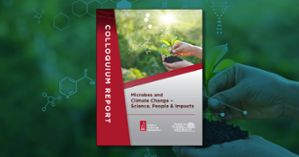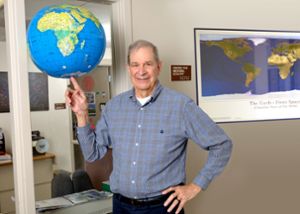MSU's Jim Tiedje a key contributor to new report on critical role of microbes in climate change
The World Health Organization identified climate change as "single biggest health threat facing humanity in 2021,” having adverse impacts on water quality, food security and global economies. Additionally, a recent report from the Intergovernmental Panel on Climate Change (IPCC) found changes to Earth’s climate in every region of the world, noting the unprecedented scale and speed in warming of the planet’s surface over the past 200 years.

To help address this problem, the American Society for Microbiology (ASM) has issued a new report, Microbes and Climate Change: Science, People, & Impacts, examining the relationship between microbes and climate change. This report is the outcome of ASM’s November 2021 colloquium meeting, which brought together 30 experts—Including Michigan State University’s James Tiedje—from diverse disciplines and sectors who provided multifaceted perspectives and insights. The American Academy of Microbiology, the scientific think tank within ASM, convened the colloquium.
“For a problem as complex climate change, we need novel approaches, new tools, and unconventional mindsets,” said Arturo Casadevall, M.D., Ph.D., Chair of the Academy Governors at ASM. “Moreover, we need to encourage partnerships between diverse scientists, policymakers, and entrepreneurs, and incentivize innovation to harness the power of microbes, which are critical to tackling climate change.”

Tiedje, a world-renowned expert in microbiology and genomics, was a key participant in the Academy colloquium and contributed to the report. He was also an author on the companion paper, Microbes and Climate Change, a Research Prospectus for the Future, published this week in ASM’s open-access journal, mBio. The mBio paper builds on concepts discussed at the November colloquium meeting and provides an extended view and opinions on research needed to fill in the knowledge gaps.
“Microbes are everywhere,” said Tiedje, MSU Professor Emeritus in the Department of Microbiology and Molecular Genetics in the College of Natural Science and the Department of Plant, Soil, and Microbial Sciences in the College of Agriculture and Natural Resources. “Some produce and consume the three most important greenhouse gases. A goal is to manage soil, waste treatment, water environments to reduce their production and favor consumption.”
The microbial sciences can provide invaluable insights in how to adapt to climate change and its cascading effects. From developing alternative fuels to preventing the spread of pathogens, the applications of microbes are vast and far-reaching. The ASM report details major recommendations for researchers, policymakers and regulators:
- Emphasize interdisciplinary research focused on understanding how microbial activities and metabolic flux alter as climate, precipitation, and temperatures change globally.
- Provide guidance for experimental design and data collection for studying microbial communities that allows for data comparison across diverse and global ecosystems.
- Incorporate existing data about microbial diversity and activity on consuming and producing greenhouse gases into Earth-climate models to improve the current and predictive performance of models.
- Increase research investments to generate knowledge and awareness of the contribution of microbes to the generation and consumption of warming gases; incorporate these findings into evidence-based policy and regulatory strategies to address climate change.
- Deploy increased surveillance and detection of zoonotic and vector-borne diseases in animals and humans, including through next generation sequencing technologies, and incorporate a One Health approach to addressing climate changes’ effects on humans, animals, and our environment.
“ASM’s new colloquium report underscores that in the quest to find solutions for climate change, we, as a society and scientific community, have new opportunities to use microbes to our benefit,” said Nguyen K. Nguyen, Ph.D., Director of ASM’s American Academy of Microbiology.
To learn more about the impact of microbes on climate change, visit the ASM’s Microbes and Climate Change resource page and read the article, What Microbes Can Teach Us About Adapting to Climate Change.
Banner image: The American Society for Microbiology is one of the largest professional societies dedicated to the life sciences and is composed of 30,000 scientists and health practitioners. Its mission is to promote and advance the microbial sciences.